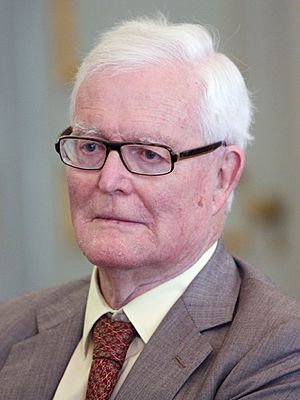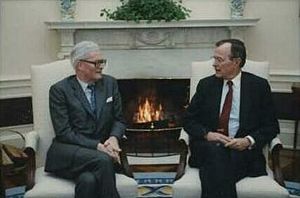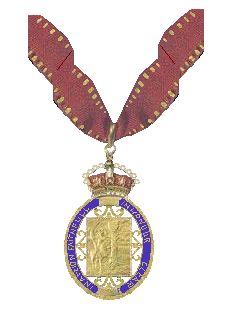Douglas Hurd facts for kids
Quick facts for kids
The Lord Hurd of Westwell
|
|||||||||||||||||||
|---|---|---|---|---|---|---|---|---|---|---|---|---|---|---|---|---|---|---|---|

Hurd in 2013
|
|||||||||||||||||||
| Secretary of State for Foreign and Commonwealth Affairs | |||||||||||||||||||
| In office 26 October 1989 – 5 July 1995 |
|||||||||||||||||||
| Prime Minister | |||||||||||||||||||
| Preceded by | John Major | ||||||||||||||||||
| Succeeded by | Malcolm Rifkind | ||||||||||||||||||
| Home Secretary | |||||||||||||||||||
| In office 2 September 1985 – 26 October 1989 |
|||||||||||||||||||
| Prime Minister | Margaret Thatcher | ||||||||||||||||||
| Preceded by | Leon Brittan | ||||||||||||||||||
| Succeeded by | David Waddington | ||||||||||||||||||
| Secretary of State for Northern Ireland | |||||||||||||||||||
| In office 27 September 1984 – 2 September 1985 |
|||||||||||||||||||
| Prime Minister | Margaret Thatcher | ||||||||||||||||||
| Preceded by | Jim Prior | ||||||||||||||||||
| Succeeded by | Tom King | ||||||||||||||||||
| Minister of State for the Home Office | |||||||||||||||||||
| In office 9 June 1983 – 27 September 1984 |
|||||||||||||||||||
| Prime Minister | Margaret Thatcher | ||||||||||||||||||
| Preceded by | Patrick Mayhew | ||||||||||||||||||
| Succeeded by | Giles Shaw | ||||||||||||||||||
| Minister of State for Europe | |||||||||||||||||||
| In office 4 May 1979 – 9 June 1983 |
|||||||||||||||||||
| Prime Minister | Margaret Thatcher | ||||||||||||||||||
| Preceded by | Office established | ||||||||||||||||||
| Succeeded by | Malcolm Rifkind | ||||||||||||||||||
|
|||||||||||||||||||
| Political Secretary to the Prime Minister of the United Kingdom | |||||||||||||||||||
| In office 1970–1974 |
|||||||||||||||||||
| Prime Minister | Edward Heath | ||||||||||||||||||
| Preceded by | Marcia Falkender | ||||||||||||||||||
| Succeeded by | Marcia Falkender | ||||||||||||||||||
| Personal details | |||||||||||||||||||
| Born |
Douglas Richard Hurd
8 March 1930 Marlborough, Wiltshire, England |
||||||||||||||||||
| Political party | Conservative | ||||||||||||||||||
| Spouses |
Tatiana Eyre
(m. 1960; div. 1982)Judy Smart
(m. 1982; died 2008) |
||||||||||||||||||
| Children | 5, including Nick | ||||||||||||||||||
| Parents | Anthony Hurd Stephanie Frances Corner |
||||||||||||||||||
| Relatives | Sir Percy Hurd (grandfather) | ||||||||||||||||||
| Education | Eton College | ||||||||||||||||||
| Alma mater | Trinity College, Cambridge | ||||||||||||||||||
| Signature | |||||||||||||||||||
Douglas Richard Hurd, Baron Hurd of Westwell (born 8 March 1930) is a British politician. He was a member of the Conservative Party. He served in the governments of Margaret Thatcher and John Major from 1979 to 1995.
Before becoming a politician, Hurd was a diplomat and a political secretary to Prime Minister Edward Heath. He first became a Member of Parliament (MP) in February 1974. He represented the Mid Oxfordshire area, which later became Witney in 1983.
Hurd held several important jobs in the government. He was Minister for Europe (1979–1983), Secretary of State for Northern Ireland (1984–1985), Home Secretary (1985–1989), and Foreign Secretary (1989–1995). He tried to become the leader of the Conservative Party in 1990 but was not successful. He left his main political roles in 1995.
In 1997, Hurd became a member of the House of Lords. He is seen as an important senior figure in the Conservative Party. He retired from the House of Lords in 2016.
Contents
Early Life and Education
Douglas Hurd was born in 1930 in Marlborough, Wiltshire, England. His father, Anthony Hurd, and grandfather, Sir Percy Hurd, were also Members of Parliament.
Douglas went to Twyford School and Eton College. At Eton, he was a top student and won important awards. He was also the head boy of the school.
After school, Hurd completed his National Service in the army. He joined the Royal Regiment of Artillery in 1948. He became an officer in 1949. He left the army in September 1949 to go to university.
University Years
Hurd attended Trinity College, Cambridge, starting in 1949. He studied history and graduated in 1952 with a top degree. While at Cambridge, he was involved in student politics. He led the Cambridge University Conservative Association. He also became the president of the Cambridge Union Society, a famous debating club.
Joining the Diplomatic Service
In 1952, Hurd joined the Diplomatic Service. This meant he worked for the British government in other countries. He was sent to places like China, the United States, and Italy. He left the Diplomatic Service in 1966 to start his career in British politics.
Becoming a Member of Parliament
After leaving the Diplomatic Service, Douglas Hurd became a private secretary to the Conservative Prime Minister, Edward Heath. This was a political job, paid for by the Conservative Party.
In February 1974, Hurd was elected as a Member of Parliament for the Mid Oxfordshire area. He was given the award of Commander of the Order of the British Empire (CBE) shortly after his election. In 1983, his constituency changed to Witney. He remained the MP for Witney until he retired from the House of Commons in 1997. He served in Parliament for 23 years.
His former constituency of Witney was later represented by David Cameron, who became the leader of the Conservative Party and Prime Minister.
Key Government Roles (1979–1995)
Douglas Hurd held many important jobs in the government under Prime Ministers Margaret Thatcher and John Major.
Minister for Europe
After the Conservative Party won the 1979 election, Hurd became a Minister of State at the Foreign & Commonwealth Office. He was the first person to hold the job of Minister for Europe, which he did until 1983.
Secretary of State for Northern Ireland
In 1984, Hurd was promoted to a Cabinet role. He became the Secretary of State for Northern Ireland. In this role, his diplomatic skills were very important. He helped to prepare the way for the Anglo-Irish Agreement. This agreement was a major step in cooperation between Britain and Ireland regarding the political situation in Northern Ireland.
Home Secretary
In 1985, Hurd became the Home Secretary. This is a very senior job, in charge of policing, prisons, and immigration. He was known as a reliable and loyal member of the government. During his time as Home Secretary, he believed that the prison system needed to focus more on helping offenders change their lives.
Hurd also introduced the Public Order Act in 1986. This law made it a crime to use "threatening, abusive or insulting" speech in public that could cause racial hatred.
Foreign Secretary
On 26 October 1989, Hurd became the Foreign Secretary. This meant he was in charge of Britain's relationships with other countries. He took over from John Major, who became the Chancellor of the Exchequer.
Leadership Election in 1990
In November 1990, Margaret Thatcher faced a challenge for the leadership of the Conservative Party. When she decided to step down, Douglas Hurd decided to run for leader. He was seen as a moderate candidate. However, he came in third place behind Michael Heseltine and John Major. John Major then became Prime Minister. Hurd accepted the result and continued to serve as Foreign Secretary in Major's new government.
Major International Events
As Foreign Secretary, Douglas Hurd dealt with many big international events. He saw the end of the Cold War and the breakup of the Soviet Union in 1991. He also oversaw Britain's response to the first Gulf War, which aimed to remove Iraqi troops from Kuwait.
Hurd worked to build good relationships with the United States. He also tried to improve Britain's relationships with other European countries. He signed the Maastricht Treaty in 1992, which created the European Union. He welcomed a united Germany back into the European community.
One of the most challenging parts of his time as Foreign Secretary was dealing with the Yugoslav Wars, especially the Bosnian War. Hurd believed that sending military aid to one side would make the conflict worse. He argued against sending weapons and for keeping an arms ban. He also resisted allowing many Bosnian refugees into Britain, believing it would put less pressure on the region to find peace. He described his approach as "realist."
There was some criticism of Hurd's policies during this war. However, he later said he still doubted that military intervention would have ended the war sooner.
Pergau Dam Project
Hurd was involved in a public issue concerning Britain's funding of a dam in Malaysia called the Pergau Dam. Building work started in 1991 with money from Britain's foreign aid budget. At the same time, the Malaysian government bought a large amount of British-made weapons.
Some people thought these two things were linked. A court later ruled that Hurd's decision to use aid money for the dam was against the law. This was because the law only allowed funding for projects that were economically sound.
In 1997, the responsibility for Britain's aid budget was moved away from the Foreign Secretary. A new government department was created for international development. In 1995, Hurd retired from his main political roles after 11 years in the Cabinet.
Life After Frontline Politics
After retiring as Foreign Secretary, Douglas Hurd continued to support John Major. He also took on some business roles, including being a deputy chairman of NatWest Markets.
Hurd left the House of Commons in 1997. On 13 June 1997, he was made Baron Hurd of Westwell. This allowed him to continue to be a part of Parliament as a member of the House of Lords. He retired from the House of Lords on 9 June 2016.
Hurd has held several other important positions. He was chairman of British Invisibles (now International Financial Services London). He also chaired the judging panel for the 1998 Booker Prize for Fiction. He became a member of a commission looking at reforms for the House of Lords. In 1999, he was appointed High Steward of Westminster Abbey.
Hurd received the award of Commander of the Order of the British Empire (CBE) in 1974. He was also made a Member of the Order of the Companions of Honour in 1996. He has received an honorary degree from Aston University.
Personal Life
Douglas Hurd has been married twice. In 1960, he married Tatiana Eyre, and they had three sons. They divorced in 1982. In the same year, Hurd married Judy Smart, who was his former parliamentary secretary. They had two children, a boy and a girl. Judy Hurd passed away in 2008.
Hurd's eldest son, Nick Hurd, was also a Conservative Member of Parliament from 2005 to 2019. He served as a Minister for Civil Society.
Hurd's second son, Thomas, joined the diplomatic service. He was awarded the Order of the British Empire (OBE) in 2006.
In 1988, Douglas Hurd started a charity called Crime Concern. This charity worked to reduce crime and anti-social behavior. It helped young people and offenders by offering training and job opportunities. In 2008, Crime Concern merged with another charity to become Catch22.
Douglas Hurd is fluent in several languages, including Mandarin, French, and Italian.
Literary Works
Douglas Hurd is also a writer. He has written political thrillers and non-fiction books.
Political Thrillers
- The Smile on the Face of the Tiger (1969, with Andrew Osmond)
- Scotch on the Rocks (1971, with Andrew Osmond)
- Truth Game (1972)
- A Vote to a Kill (1975)
- Palace of Enchantments (1985, with Stephen Lamport)
- The Shape of Ice (1998)
- Image in the Water (2001)
- 10 Minutes to Turn the Devil (2015), a collection of short stories.
Non-Fiction Works
- The Arrow War (1967)
- An End To Promises (1979)
- The Search for Peace (1997)
- Memoirs (2003)
- Robert Peel, a Biography (2007)
- Choose your Weapons (2010)
- Disraeli: or, The Two Lives (2013, with Edward Young)
See also
- Thatcher Ministry (1979–1990) and Major Ministry (1990–1997), Governments in which Hurd served
- Order of the Companions of Honour
- List of political families in the United Kingdom
- Tory Reform Group
- British-American Parliamentary Group
- Margaret (2009 film)
 | Roy Wilkins |
 | John Lewis |
 | Linda Carol Brown |



